 |
 |
 |
Horatio Stratton Carter, universally known as Born in Sunderland on 21 February 1913, he was a winner from the start,
being awarded four England caps at schoolboy level in the 1926-28 period.
He was rejected by Leicester City after trials, but Sunderland, his home
town team and among the giants of the English game, were on the look out
for good young local talent and signed him as an amateur in November 1930.
He gave up a position as an apprentice engineer to turn professional a
year later. Carter made his senior bow for the Roker side two months before his 19th
birthday in the 1933/34 season. He was capped at full level for the first
time by England in 1934, in the 3-0 win against Scotland at Wembley. Carter made outstanding progress in the Sunderland and England sides
and became the youngest man ever to captain a League championship winning
team when he led an ageing Sunderland side to their first title win in
23 years in 1936, aged just 22. He was the club's joint top scorer, despite
his primary responsibility being to run the midfield. It was a momentous season for Sunderland and Carter as they finally put
an end to the championship dominance of the glorious Arsenal team of the
Thirties. The Gunners had won the title for the previous three seasons,
but Sunderland were simply unstoppable that year, winning the championship
by a clear eight points. One crucial game on the way to glory was the
home game with the reigning champions on December 28. Sunderland ran out
5-4 winners in an extraordinary tussle which saw Carter hit their last
three goals. Carter was again the leading light when he scored a last minute winner
in the Charity Shield battle between the two teams in October 1936 and
the day belonged to him again the following May. After marrying his sweetheart,
Rosie, at the end of April 1937, Carter had only spent a few hours with
her before leading out his beloved Sunderland for the FA Cup Final against
Preston North End. The Lancashire side took the lead in the 38th minute,
but seven minutes after half time Bobby Gurney equalised from a Carter
corner. Twenty minutes later Carter gave Sunderland the lead and soon
afterwards laid on Sunderland's third before receiving the trophy from
the Queen in Coronation year. Raich Carter believed in doing everything
with a certain amount of style. He was now 23 and had the football world at his feet, but his glorious
career was put on hold by the onset of war in 1939. During the conflict
he served in the RAF and appeared as a guest for Derby County whilst helping
to rehabilitate injured airmen at RAF Loughborough. He was probably at
his peak during the war years and added 17 unofficial caps and 18 goals
to his meagre official total of 13 internationals and 7 goals. Some of
those caps were gained after the war and he played his final game for
England in 1947 as they beat Switzerland 6-0 at Highbury. In his time with England Carter proved the ideal partner for the brilliant
winger, Stanley Matthews. Carter once complained that when he gave Unsettled at Sunderland, who after a disagreement had put Carter on the
transfer list, he moved on to Derby County permanently in December 1945
for a fee of £8,000. 'Sunderland were silly to sell me for that price
and Derby were lucky to get me,' he once said. At Derby, he formed a dynamic
partnership with Irish international Peter Doherty, who served with him
at Loughborough, and they helped the Rams to an FA Cup Final success over
Charlton Athletic in 1946. Carter didn't manage to score in the 4-1 Wembley
win, but he was the club's top scorer with 12, despite only arriving part
of the way through the season. He thus became the only player to gain
a winner's medal on either side of the war. In March 1948, Third Division side Hull City made a shock move for 35-year-ld
Carter. The Yorkshire club were now managed by the charismatic and dictatorial
Major Frank Buckley, who had enjoyed success
and headlines before the war when he had built Wolves into a First Division
power. Buckley put £6,000 of Hull's money up to secure a player who was
still marvellously gifted. Carter also became Buckley's assistant and
a couple of months later he took over as player manager when Second Division
Leeds United lured away the Major to lead their promotion drive. Carter's debut on 3 April 1948 came too late to help Hull's faltering
promotion bid and they eventually finished fifth, but he was undoubtedly
the star of the Third Division and was able to demonstrate all of his
skills on the field. He proved himself an astute and able manager and
led the club to the Division Three The following November he paid Leicester City £20,000 for their 22-year-old
inside-forward Don Revie. The attraction of playing with one of his schoolboy
heroes really appealed to Revie, who had first caught Carter's eye during
a match between the two clubs earlier in the season. Among Carter's other
buys was former Stoke and England centre half Neil Franklin. Carter went on playing until 1953, but recognised much sooner that he
was nearing the end of his playing days. He had seen enough in Revie's
play to believe he might be his ideal replacement as Hull's playmaker.
The two played together in the Hull forward line and Revie loved every
minute of learning from the master. He admired most Carter's ability to
find space on the pitch, attract the ball like a magnet and always having
the time and assurance to play the killer ball. Revie learnt much from
Carter and was inspired by the way he ran the game. They tended to play in the same way, however, and did not really gel.
Revie had to adapt into a deeper half back position and Carter didn't
rate Revie's time at Hull was a success: 'I think he let me down. I was
expecting too much too soon. Revie didn't play as well as I thought he
would … I always thought he was an inside forward but he didn't have the
punch an inside forward should.' Hull's form was inconsistent. Franklin sustained a cartilage injury and
in September 1951 Carter quit Hull after a dispute with the directors,
saying he was leaving because of 'disagreements on matters of a general
nature in the conduct of the club's affairs'. He retired to run a confectionery shop in Hull and a month later Revie
was off to Manchester City and eventual England honours after a £25,000
deal. In the absence of Carter, Franklin and Revie, Hull City struggled
and spiralled down the table. Carter was persuaded to come back for the
tail end of the season and led the club in their successful fight against
relegation before retiring, taking his final Football League playing record
up to 218 goals in 451 games. In January 1953, the Silver Fox was back at the age of almost 40, making
a comeback with Cork Athletic in Ireland and Carter inherited a Second Division side which had come close to promotion
several times under Buckley. They had an undoubted star in John Charles,
but suffered extensive financial difficulties with little money available
for buying new players. In Carter's first season, Leeds finished tenth,
exactly the same as in Buckley's final year, but Charles had a remarkable
time of it, hitting a club record 42 goals in 39 league games. Carter had a self confidence that some of the players at Elland Road
felt bordered on arrogance. A dressing room row following a bungled free
kick routine that cost Leeds a goal during a 5-3 defeat at Bury early
in 1954-55 made captain Tommy Burden decide that he'd had enough: "Carter
was blaming the goalkeeper John Scott. I thought 'This isn't fair …' so
I turned round and said, 'You're the one who's bloody well to blame.'
We fell out. I think Raich suffered from thinking that there weren't many
better players than he." Burden, who had regularly made the marathon 500 mile round trip to matches
at Elland Road from his home in Somerset for more than six years, was
transferred to Bristol City. He was not alone in finding the new Leeds
manager hard going. Jack Charlton, too, was unconvinced of Carter's abilities: 'Raich Carter
wasn't a coach, and he didn't employ coaches. Everyone respected him as
a great player of the past, but he didn't understand that you might need
help to work on your game. Maybe Raich was such a good player that he
didn't understand how things that came easily to him might be difficult
for other people. The only training we used to do at Elland Road in those
days was to run down the long side of the pitch, jog the short side, sprint
the long side, and so on. We used to have five-a-side and eight-a-side
matches on the cinder surface of the car park. But no one ever coached
you, there was nobody you could talk to about your game, we never went
out and practiced free kicks or corner kicks or anything like that. We
never really had any team talks, and we never had a run down on the opposition.
Leeds United wasn't what I would call a professional club in those days.
You trained in the morning, you went home - nobody bothered what you did
the rest of the day.' 'Carter was very opinionated,' says John Charles. 'He had the view 'I
do it this way, so you do it this way, whichever way I say.' He wouldn't
let you argue. He was a nice man but he loved himself. He would take the
credit for what you'd done.' Yet Carter made sure that he developed Charles' potential to the full,
and gave him some valuable coaching and insights on how to improve his
game. The Welshman continued to prosper under Carter's leadership and
in 1956, the two of them led Leeds
United to a promotion triumph. They started well enough back in the First Division, but when they lost
forward Albert Nightingale through injury in the first game and finally
sold Charles at the end of the season, reaping a world record £65,000
from Juventus, their form inevitably suffered. Carter maintains he was
given less than half of the Charles money to find a replacement and Leeds
finished the 1957/58 season in a disappointing 17th place. Despite the promotion success and all Carter's pleadings of inadequate
funding, the Leeds directors declined to extend the manager's contract
when it He stayed away from the game for a while, but could not resist its draw
for long and was appointed manager at Third Division Mansfield Town in
January 1960. He couldn't prevent their relegation at the end of the season,
but after two seasons of struggling, they returned to the Third Division
in 1963 after finishing fourth. Carter wasn't there to see the final triumph,
however, as he left to manage Middlesbrough, then in Division Two, in
January 1963, taking over from Bob Dennison. The Ayresome Park club were in decline after the loss of goalscoring
wonder boy Brian Clough to North East rivals Sunderland in 1962 and Carter
struggled to improve matters. His dealings on the transfer market were
disappointing. He allowed promising players like Alan Peacock and Cyril
Knowles to leave the club and did not buy wisely with the money. Stan Anderson was Raich Carter's last signing, having previously skippered
both Newcastle and Sunderland in a distinguished career. However, he did
not originally intend playing for Boro, nor was it Carter who enticed
him to Teesside: "It was Eric Thomas (Boro's then chairman) who persuaded
me to join Middlesbrough. I was always interested in becoming a coach,
and he said to me 'Boro are struggling. Come and be our coach.'" The laid back style of Carter's management is exemplified by a story
told by Anderson. Soon after he joined Boro as player/coach, the team
were on their way to a vital away game that they could not afford to lose;
relegation was staring them in the face. 'On the coach going to the match, I had a word with Raich and told him
that he needed to give the players a strong team talk before the game;
he really needed to gee the lads up, because we were dropping down the
league like a stone. 'So as the coach pulls to a halt in the car park, Raich stood up and
said "Right lads, here we are, 'I was just speechless. I had to get up and follow that! I did my best,
but of course, we lost the match. The problem was that because Raich was
such an exceptionally gifted footballer in his day, he thought that everyone
else could do the same, and couldn't understand that most players would
never be as good as he was no matter how hard they tried.' By February 1966 Boro were as good as relegated to the old Division Three
for the first time in their history, and Carter paid the price with his
job. He ended his association with football after this and returned to Hull
to run a sports department in a local store. He later ran a credit business
in Hull. He suffered a stroke in September 1994, and passed away at his
home at Willerby, near Hull, aged 81, leaving a widow, two daughters and
a son. Raich Carter was one of the greatest inside-forwards ever produced by
England, being often referred to as 'The Maestro' for the way he took
control of games. He was the complete inside-forward who could create
and take chances with equal flair. He had a fine footballing brain and
could shoot fiercely with either foot. He was an arrogant performer, strutting
around the midfield and dictating the flow of play as he saw fit. He had
been a superb talent, the master of all the attacking arts. He carried
shooting power in both foot and married his talent with resolution and
dedication. It seemed, however, that the mundane part of the manager's role, the
administration, the negotiation, the day to day stuff, was boring for
him. He missed the joy of playing and didn't pay due attention to the
duller part of the job. As a perfectionist, he was constantly frustrated
by having to deal with run-of-the-mill footballers. He had probably earned
the right to such an attitude. He also shone at cricket, winning a county cap from Durham CCC in 1932
when he made three appearances for Derbyshire, and was an athletics star
as a schoolboy.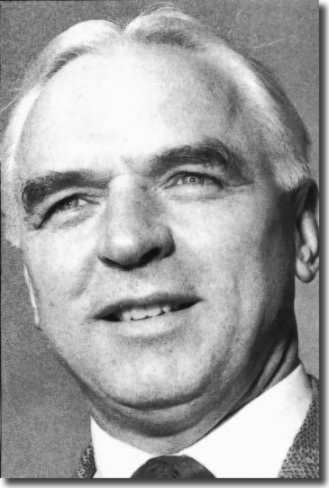 Raich
and nicknamed The Silver Fox for his grey hair and wily play, was one
of the greatest inside forwards ever produced by England, an ice cool
player who always seemed to be the one pulling the strings and making
things happen. He had won every honour the English game had to offer by
the age of 24 and, even though his managerial feats never equalled the
extraordinary playing achievements, he was still good enough to help Leeds
United regain their First Division status in 1956.
Raich
and nicknamed The Silver Fox for his grey hair and wily play, was one
of the greatest inside forwards ever produced by England, an ice cool
player who always seemed to be the one pulling the strings and making
things happen. He had won every honour the English game had to offer by
the age of 24 and, even though his managerial feats never equalled the
extraordinary playing achievements, he was still good enough to help Leeds
United regain their First Division status in 1956.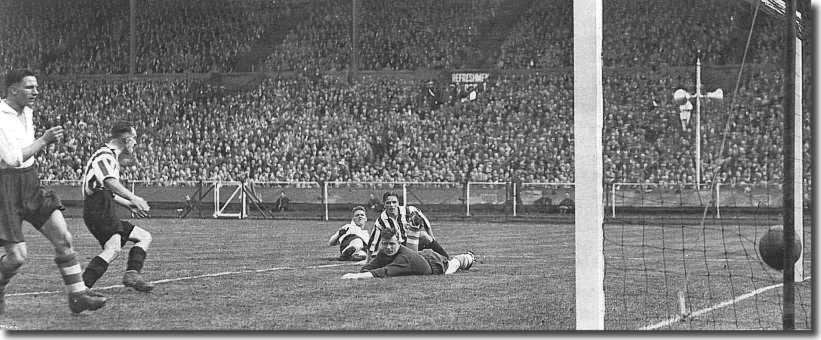 Matthews
the ball, he never gave it back, and the two often vied for the starring
role in an illustrious team.
Matthews
the ball, he never gave it back, and the two often vied for the starring
role in an illustrious team.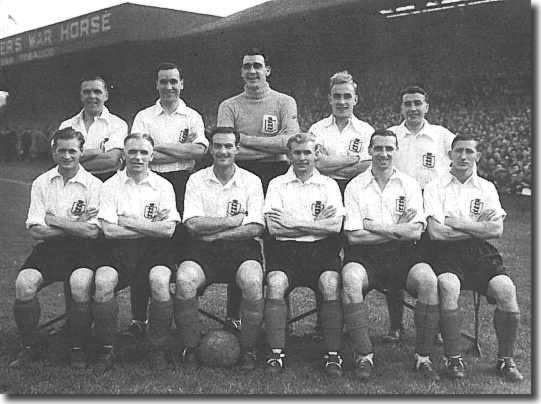 championship in 1949.
championship in 1949.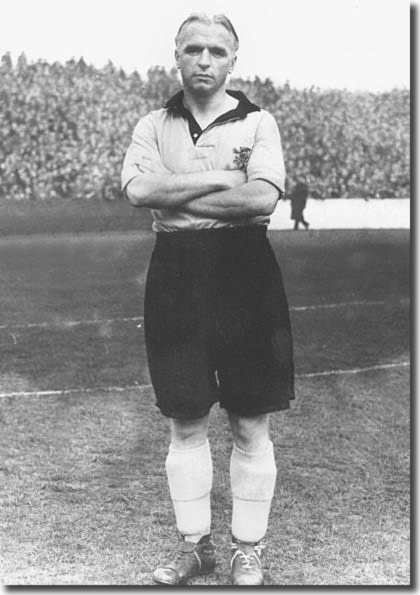 inspiring them to an Irish Cup win. Following that success he answered
the call of the Leeds United board and took over as manager from Major
Frank Buckley for a second time.
inspiring them to an Irish Cup win. Following that success he answered
the call of the Leeds United board and took over as manager from Major
Frank Buckley for a second time.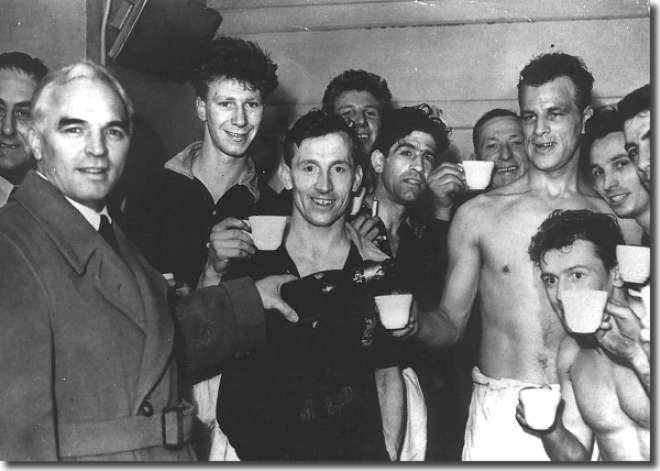 came
up for renewal in May 1958. He was devastated and the move came as a surprise
to most of the football world. It was a bitter and contentious time for
the club and Carter, who understandably felt hard done by.
came
up for renewal in May 1958. He was devastated and the move came as a surprise
to most of the football world. It was a bitter and contentious time for
the club and Carter, who understandably felt hard done by.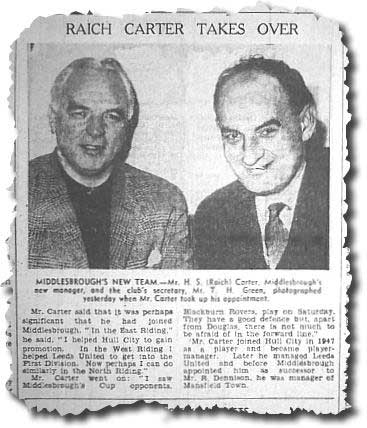 safely
arrived at our destination. Look at this man sitting next to me who drove
us here; he got us here correctly, safely and did a smooth professional
job. That's what I want from you tonight lads, give me a professional
job. Right, over to you Stan."
safely
arrived at our destination. Look at this man sitting next to me who drove
us here; he got us here correctly, safely and did a smooth professional
job. That's what I want from you tonight lads, give me a professional
job. Right, over to you Stan."